In October, we received an incredible response from our article on “How to Make Better Eggs.” As many of you highlighted in the comments from that article, we left out one important method of preparation: the omelet. Of course, this was done for good reason, as we felt that omelets deserved a post all their own. So gentlemen, we continue our discussion today on the manly topic of breakfast with an exploration of how to make an omelet.
Enjoy!
MM
How to Make an Omelet
I know you’ve seen him. The guy on the breakfast buffet line that’s standing over the stove churning out omelets made to order. That guy! Seriously, who doesn’t love the omelet guy? The next time you find yourself at a breakfast buffet or crashing at an Embassy Suites, make sure to pay special attention to the man behind the fire. The “hotel omelet” (as I will refer to it in this post) is one of the easiest omelets to prepare. Let’s do a play-by-play:
You order up an omelet featuring one of several items sitting on display. The pan hits the heat along with a generous portion of melted butter or oil, followed by an array of finely diced ingredients. To finish, a pour of 2 – 3 frothy eggs, a quick scramble and a flip, cheese, and the essential fold. In less than 3 minutes you’ve got a perfectly satisfying meal. Who says you don’t have time to make a killer omelet in the morning?
Okay, so with all of that ease, why is it that the omelet is considered one of the more difficult breakfast dishes? It’s all about the details. New chefs looking for work are often required to make an omelet as part of their evaluation process. With so many techniques and varying opinions, even the slightest mention of proper omelet preparation definitely draws in critiques. For simplicity, in this article I’m only covering the two techniques that I use most often in the kitchen. The first, as described above, is what I will dub the “hotel omelet.” The second, we’ll just call the “classic.”
The “classic” omelet usually features heartier fillings that are prepared aside from the surrounding egg. Instead of finely diced and meager portions, the classic omelet is bursting with ingredients and fillings. For example, in one pan let’s say that I’ve sautéed some roughly chopped vegetables. To go along with the vegetables, on the side I have a generous portion of shredded cheese to use as my filling. Preparing all of these ingredients in the “hotel omelet” manner would be way too heavy and cumbersome to flip and cook appropriately. Instead, we simply prepare the egg portion on its own, and as the egg sets, we add the other cooked ingredients, fold, and serve. Seriously, it’s that easy.
The key in either method is preparing the actual eggs. Think of our Hot and Fast method for scrambling eggs. As the entire egg portion begins to set on the bottom, we begin to gently lift the cooked eggs off the surface and tilt the pan to allow the runny portion to run towards the heat. In this instance, instead of scrambling, the goal is to keep the entire egg portion intact, holding the shape of the pan.
The best quality of an omelet is its versatility. The eggs are a blank canvas for an endless combination of ingredients and flavors. I’ve highlighted some of my favorite combinations below.
Western: Onion, Bell Pepper, Mushrooms, Ham, Cheddar Cheese
Coastal: Onion, Mushrooms, Crab Meat, Mozzarella Cheese
BBQ: Pulled Pork, BBQ Sauce, Green Onion, Cheddar Cheese
Veggie: Onion, Spinach, Mushrooms, Tomato, Provolone Cheese
Greek: Onion, Tomato, Spinach, Artichoke Hearts, Feta Cheese
Arizona: Pico de Gallo, Diced Chicken, Sliced Avocado, Pepper Jack Cheese
Mediterranean: Onions, Tomatoes, Kalamata Olives, Feta Cheese
Creole: Red Bell Pepper, Crawfish Tail Meat, Chives, Gouda Cheese
Lorraine: Caramelized Onion, Crispy Bacon, Gruyere Cheese
Spanish: Chorizo, Piquillo Peppers, Green Olives, Manchego Cheese
Coastal: Onion, Mushrooms, Crab Meat, Mozzarella Cheese
BBQ: Pulled Pork, BBQ Sauce, Green Onion, Cheddar Cheese
Veggie: Onion, Spinach, Mushrooms, Tomato, Provolone Cheese
Greek: Onion, Tomato, Spinach, Artichoke Hearts, Feta Cheese
Arizona: Pico de Gallo, Diced Chicken, Sliced Avocado, Pepper Jack Cheese
Mediterranean: Onions, Tomatoes, Kalamata Olives, Feta Cheese
Creole: Red Bell Pepper, Crawfish Tail Meat, Chives, Gouda Cheese
Lorraine: Caramelized Onion, Crispy Bacon, Gruyere Cheese
Spanish: Chorizo, Piquillo Peppers, Green Olives, Manchego Cheese
Now that we’ve covered the basics, let’s get cooking. Remember, today’s article focuses on two simple omelet preparations dubbed the “hotel omelet” and the “classic omelet.” Feel free to share in the comments your preferred method and tips for other readers.
Hotel Omelet – finely diced, minimal ingredients, all cooked together in a single pan. (Serves 1 – 2, Prep 5 minutes, Cook 10 minutes)
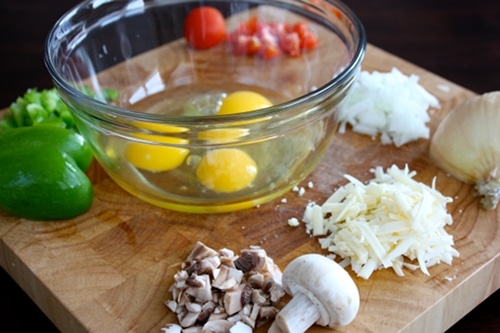
1 Tablespoon Unsalted Butter
2 Tablespoons Green Bell Pepper, finely diced
2 Tablespoons Onion, finely diced
1 Tablespoon Tomato, finely diced
2 Tablespoons Mushrooms, finely diced
3 Large Eggs
Kosher Salt
Fresh Cracked Pepper
¼ Cup White Cheddar Cheese, grated
2 Tablespoons Green Bell Pepper, finely diced
2 Tablespoons Onion, finely diced
1 Tablespoon Tomato, finely diced
2 Tablespoons Mushrooms, finely diced
3 Large Eggs
Kosher Salt
Fresh Cracked Pepper
¼ Cup White Cheddar Cheese, grated
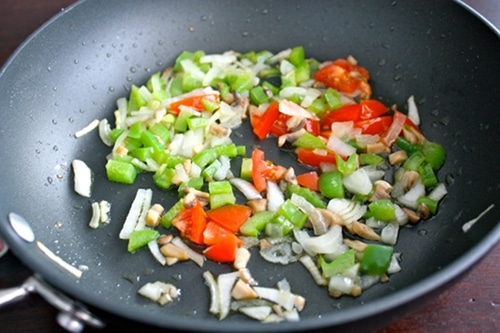
Preheat a 10 inch non-stick skillet over medium high heat; add and melt butter. Add the next four ingredients and sauté for 3 – 4 minutes, or until just tender.

Meanwhile, whisk together eggs until frothy and combined and season liberally with salt and pepper. Add eggs to pan and cook undisturbed for 45 – 60 seconds.
Using a wooden spoon or spatula, carefully lift the cooked portions from the bottom of the pan while tilting the pan to allow the runny portions to reach the hot surface. When the majority of the eggs have set, and with the top portion still moist, carefully flip the omelet over using a spatula–or score some bonus points by flipping the omelet in the pan by using a quick back and forth motion, gravity, and the lip of the pan (Note: you might want to do this over the sink on the first try).

Sprinkle cheese on one side of the omelet and cook the underside for another 45 – 60 seconds. Finally, serve the omelet out of the pan, folding over the other side as you plate to melt the cheese and finish the presentation. Serve.
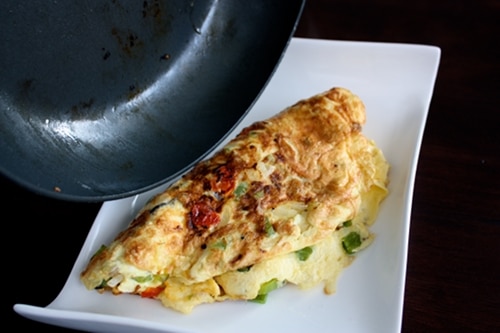
Classic Omelet – ingredients prepared separately from the eggs, and then assembled together just before serving. (Serves 1 – 2, Prep 5 minutes, Cook 10 minutes)
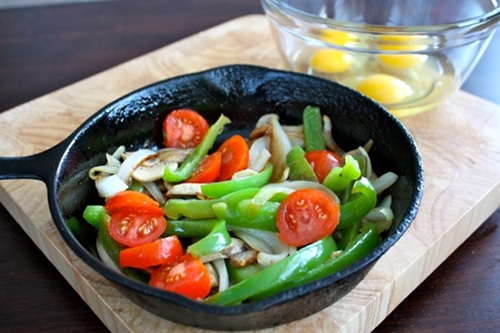
2 Tablespoons Unsalted Butter, divided
½ Green Bell Pepper, roughly chopped
¼ Onion, roughly chopped
3 Cherry Tomatoes, halved
¼ Cup Mushrooms, roughly chopped
3 Large Eggs
Kosher Salt
Fresh Cracked Pepper
¼ Cup White Cheddar Cheese, grated
½ Green Bell Pepper, roughly chopped
¼ Onion, roughly chopped
3 Cherry Tomatoes, halved
¼ Cup Mushrooms, roughly chopped
3 Large Eggs
Kosher Salt
Fresh Cracked Pepper
¼ Cup White Cheddar Cheese, grated
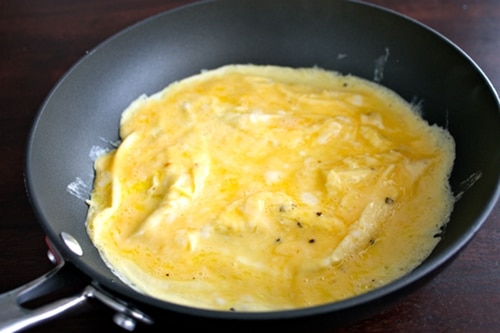
Preheat a cast iron skillet over medium heat; add and melt butter. Add the next four ingredients and sauté for 5 – 7 minutes, or until just tender. Meanwhile preheat a 10 inch non-stick skillet over medium high heat; add and melt remaining butter. Whisk eggs together until frothy and combined and season liberally with salt and pepper. Add eggs to the non-stick skillet and cook undisturbed for 45 – 60 seconds.
Using a wooden spoon or spatula, carefully lift the cooked portions from the bottom of the pan while tilting the pan to allow the runny portions to reach the hot surface. Continue in this manner until no more runny portion remains.
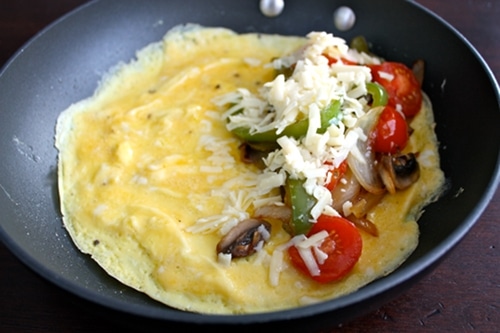
Remove the sautéed ingredients from the cast iron skillet and place on one half of the eggs; top with cheese.
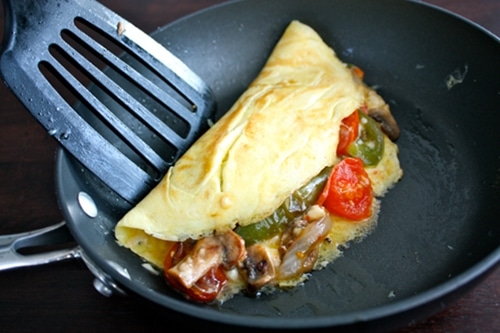
Using a spatula, carefully fold the omelet over and remove from pan. Serve.






0 comments:
Post a Comment